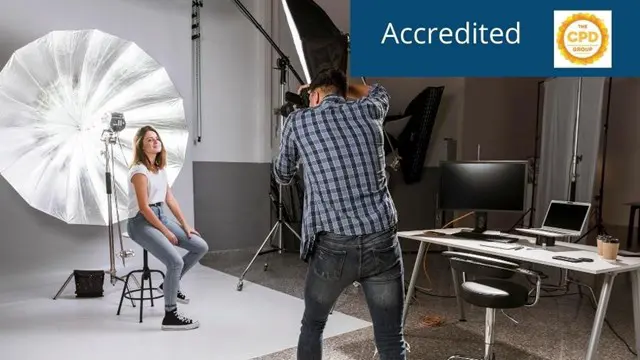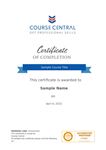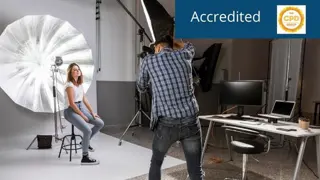
Master Photography: Camera Settings, Lighting, Composition & more
800+ Students! CPD Accredited Beginner to Advanced Courses | 2 Free PDF Certificate Included
Course Central
Summary
- Certificate of completion - Free
- Tutor is available to students
Add to basket or enquire
Overview
A bundle masterclass in Photography covers all basic camera settings, tips for getting sharp images, understanding of light and composition, easy ways of taking unique outdoor portraits, getting better landscape photos, and better flash photos indoors with a handful of practical techniques for anyone with any skill set to use the application confidently as a professional.
An industry-renowned pro photographer passionate about photography has developed this course on how to use Photography to your benefit with tips and tricks for taking amazing photos with your DSLR or Smartphone in any sector.
Becoming a Photographer is one of the most popular careers in the UK today. All you need is to master the skill of capturing pictures. Keeping this in mind, this course started with an essential understanding of image quality, resolution, camera types, features and settings.
Without photography, today's world would be unrecognisable. From public museums to personal memories, medicine to movies, and newsrooms to NASA, photographic imaging has become indispensable to understanding ourselves and our universe over the past two centuries. Photographs play an important role in everyone's life – they connect us to our past and remind us of people, places, feelings, and stories. They can help us to know who we are.
Photography is important because it opens a view into a person's mind and allows them to convey messages. Photojournalists and the media are essential in showing us what is happening worldwide.
Photography has shaped how we remember things, from global-scale events to domestic and familiar occurrences. The importance of photography can never be underestimated. The way your brand is perceived has a significant effect on your business. The three variables that matter the most in photography are simple: light, subject, and composition and this bundle course demonstrate from top to bottom to sharpen your skill.
This entirely online course has expanded on photography in many aspects as it suits your need to ensure you can do your job as a Photography expert.
You can start with any skill set and will reach the next level at the end of this course.
Moreover, the course has been accredited by the CPD group, and they will earn you the essential 12 CPD points for your Continuous Professional Development.
This Photography Masterclass courses bundle consists of the following courses:
- Course 1: Photography - Become a Better Photographer - Part I
- Course 2: Photography - Become a Better Photographer - Part II
You will be able to do the following after completing this course:
- To explain camera settings Photography.
- To demonstrate easy tips for getting sharp images, Photography
- To show how an understanding of light and composition is worth more to you than a whole bagful of camera accessories Photography
- Raise awareness of the possibilities for taking great photos in Photography
- To demonstrate easy ways of taking unique outdoor portraits, Photography
- To show some great ways of getting better landscape photos, Photography
- To provide tips on getting better flash photos indoors Photography
- To show how to take better photos in specific environments (e.g. snow, indoors by a window, etc...)
- To help understand image quality, resolution, and the different camera types.
- To realise the great potential, you have for becoming a great photographer
- This Photography course will give you a greater understanding of your camera's features and settings.
- This greater understanding will allow you to get more consistent exposures, better focusing, and improved image quality.
- The real-world examples provide the best settings in typical scenarios, ensuring outstanding results.
Why Choose a Photography course?
- Accredited by CPD
- Conducted by industry experts
- Get Instant E-certificate
- This Course is a Fully online, interactive course with Professional voice-over.
- Qualified professionals develop this course.
- Self-paced learning and laptop, tablet, and smartphone-friendly
- Tutor Support
And you will also get these gifts with this Photography course
- Free PDF Certificate
- Lifetime Course Access
CPD
Course media
Description
*** Become a Better Photographer - Part I ***
Course Content:
Course Introduction
The instructor demonstrates vital factors to remember before the camera setting. Module one covers uses, understanding the exposure triangle, and leaving auto mode. Expands to the ISO setting steps, function, importance, the practical necessity of exposure compensation, and when applied to darken or lighten images. You'll also be able to use lens apertures and knowledge about one of the most important camera settings.
More advanced camera settings
This module will give you more skills in advanced camera settings steps, for instance, 5 tips for tack sharp focusing, choosing the proper shutter speeds to avoid camera shake, getting sharper photos, and using your histogram to nail the exposure for those important images. You'll also develop a deep understanding of aperture & depth of field – start getting creative (DSLRs), scene modes & compact cameras.
Improve your images with natural lighting
Module three is to familiarise top shade, the professional’s portrait lighting secret, dealing with the sun when taking a portrait, the direction of light, the effect it has on your photos, getting lovely blue skies in your photos, and avoiding white skies. You will also gain knowledge to retain the ambient light of a nicely lit room, practical knowledge about better indoor portraits using window light in parts 1 and 2, creating a great look using backlighting, and improving your natural light portraits using a reflector.
Improve your images using better composition
Module four will equip you to use the rule of thirds for improved composition, diagonal lines and ‘leading lines’ to create dramatic images, repeating patterns for more impact, and the ‘frame within a frame’ trick. You'll also explore blurring the background for more effect (DSLRs) and isolating your subject (Compact Cameras), prevent cluttered backgrounds and not ruin your portraits, improving your photographs using unusual and natural abstract backgrounds.
Tips on posing for portraits
This module demonstrates flattering your subject with full-length posing tips, family or small group poses – Pt I standing and Pt II seated poses, individual natural and relaxed female poses, and ideas for photographing children, 4-6 to 9-12 months old.
Landscapes and scenery
Module six explains landscape photography tips, a walkthrough with Barbara, and how to take better photos in the snow.
Flash photography
This module will enable you to gain better results using an external flashgun, Pt I – bouncing the flash, Pt II – more creative portraits, expands to built-in flash – softens the shadows and better results using on-board flash and a more pleasing background.
Information and tips on using lenses
Module eight focuses on general tips on camera lenses, variable/fixed apertures, fast/slow, prime lenses, lens focal length, pt I – perspective, pt II – ‘field of view,’ and finally, pt III – ‘depth of field’
Other general techniques
Module nine demonstrates a neat idea for a fun, dramatic portrait, the ‘half-press of the shutter technique to improve your picture taking and create a stunning online slide show in minutes. Using the fashion photographer’s perspective trick for longer legs, you'll also explore taking fireworks photos.
How to take a flattering Profile or PR photo
This module will show you taking a more positive PR or Profile photo – A fundamental technique using ‘top shade, a flattering profile, and refining the basic profile or PR image.
Which digital camera to buy next? Megapixels are not the answer.
Module eleven explains the myth of megapixels – image resolution, quality, and which camera you should buy next – so many to choose from!
*** Become a Better Photographer - Part II ***
Introduction
The instructor covers an overview of the course and some practical next steps to sharpen your gateway to becoming a better Photographer.
Basic Settings
Module two demonstrates exposure fundamentals, the ‘exposure triangle, lens apertures, developing skills about one of the most crucial camera settings, and the basics of shutter speed. You'll also understand the ISO, setting, importance, and exposure compensation to brighten or darken your subject.
Slightly more advanced features & settings
This module will help you to understand and use creative depth of field, aperture vs. shutter speed priority. Which should you use? Next, with a better choice, you will travel to the exposure metering modes explanation, the difference between full auto and the ‘P’ mode.
Advanced exposure techniques
Module four shows advanced valuable manual exposure mode with ease, manual and auto ISO – introducing a third exposure mode! Explore how histograms can help you take better photos, exposure bracketing, challenging lighting scenarios, and HDR.
Focusing tips
This module demonstrates 5 tips for tack sharp focusing when photographing stationary subjects, keep moving subjects in focus using continuous focusing, and the back button focuses on your DSLR.
Creativity and Real-World Scenarios
Module six will enable you to use shutter speed Pt 1 – the cyclist and Pt 2 – running water expands to photography: camera and lens settings for portraits.
Landscape Photography
This section demonstrates an introduction to landscape photography, camera settings, introduction to full, fader, and graduated neutral density filters, landscape session 1- up high just before sunset, and session 2-along the grand union canal. Later you'll be able to brush up your skills on landscape walkthrough parts 1 to 3 with settings and explanations.
Image quality
Module eight explains RAW vs JPG image formats, your better choice, understand white balance, and get better colours in your images.
Using Flash
This module will guide you to grasping basic camera settings for flash photography, flash maximum sync speed, and high-speed sync brightens up your portraits with a little ‘fill flash.’
Supplementary Documents
Module ten explains the camera settings FAQ, some of the instructor's photos, settings, and workflow.
Certificates
Course Central is proud to offer a Certificate of Completion to all who complete courses successfully. Course Central tracks the learner’s course progress. However, the learner is responsible for validating the completion and understanding of the course. All Certificates of Completion can be validated from the Course Central website using the validation code.
Transcripts
A Transcript for the course with completed module details can be requested for as little as £4.99. Please note that all course Certificates and Transcripts will be titled as published on the Course Central platform.
Who is this course for?
This Photography course would benefit anyone wishing to explore the creative potential of their photography practice. Photography is an industry that makes for a great career, with opportunities growing everywhere. With a DSLR camera, you can brush up your skills in several types of photography, such as digital, landscape, travel, commercial, or photography with a DSLR camera. The courses combine practical skills with artistic skills.
If you are both logical and creative, you should consider studying photography. There are many different career fields to pursue, or you can even start your own business! Learning about photography can open up a world of opportunities. Photography can allow for self-expression, as well as improve your technical skills.
Photography isn’t just another hobby. It has the potential to keep people connected, no matter how far apart. On top of this, you don’t need some elaborate degree to be a successful photographer! Experience doesn't matter. You can learn many things about composition, light, exposure, and so on that will easily take you to the next level. You can learn these by yourself.
One picture can say a million things. It helps keep everyone around you in touch with what’s happening in your life. Photography, and the portfolio you’ll build up as you go along, can connect you to other photographers. You’ll also be able to network with them and build on your credibility.
Requirements
Photography
Existing qualification level: No specific previous qualification is required. However, a basic understanding of Maths, English and ICT would benefit in understanding the content.
Existing skill levels: Minimum ICT skills to operate any computer system is beneficial. No skill in working with Photography is essential.
Technical requirements: Access to any computer or laptop would benefit from practising and following the instructions.
Any type of camera will be suitable for this Photography course. Some lectures covering the same topic are duplicated so that they can be DSLR or compact camera specific.
Career path
Photography has many opportunities for anyone due to its growing high demand in a versatile field, from photogrammetrist, weddings, freelance, forensic, still, medical, news photographers, and not limited to this.
The salary expectation can grow from £17,000 per annum to £35,000 per annum.
Questions and answers
Hi is the course in the day time or could I do it anytime of the day the course sounds great
Answer:Hello Peter, The Photography Masterclass course is completely an online course. You can access this Photography course from any part of the world with just a smart device and the internet at your convenient time.
This was helpful.Hi there my camera stopped working last year and right now I'm saving again for a new one. Would I be able to buy this and start it when I get a new 1
Answer:Hi Kristy, Yes, definitely. You'll get a lifetime access for this course. So once you purchase it, you can access and complete it whenever you want. I hope this helps.
This was helpful.What course do I need to do to work my way up to professional from beginner. interested in taking all sorts of photos. Thanks Carrie Hewson
Answer:Hi Carrie, This Photography Masterclass course starts with the basic knowledge of Photography and gradually shares expertise knowledge. In this course you will get a complete idea of Photography with key concepts, strategies regarding use of it and in-depth knowledge.
This was helpful.
Certificates
Certificate of completion
Digital certificate - Included
The course qualifies for 12 CPD points accredited by the CPD group.
Reviews
Legal information
This course is advertised on reed.co.uk by the Course Provider, whose terms and conditions apply. Purchases are made directly from the Course Provider, and as such, content and materials are supplied by the Course Provider directly. Reed is acting as agent and not reseller in relation to this course. Reed's only responsibility is to facilitate your payment for the course. It is your responsibility to review and agree to the Course Provider's terms and conditions and satisfy yourself as to the suitability of the course you intend to purchase. Reed will not have any responsibility for the content of the course and/or associated materials.



